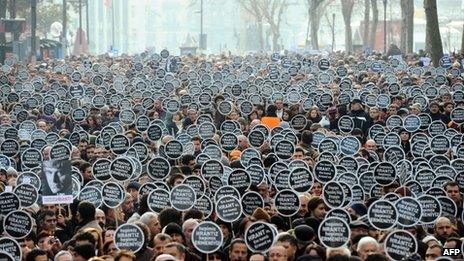Hrant Dink: Istanbul march as verdict anger continues
- Published

At least 20,000 people have marched in Istanbul to mark five years since the murder of prominent Turkish-Armenian journalist Hrant Dink.
Some of the demonstrators were driven by anger over verdicts delivered this week in the latest trial of people linked to his killing.
Three people were jailed but allegations of official negligence or state collusion were rejected.
Dink's actual killer, Ogun Samast, was jailed earlier for 22 years.
The journalist, shot dead outside the Istanbul offices of Turkish-Armenian newspaper Agos, had angered Turkish nationalists by describing the mass killing of Armenians a century ago as genocide.
On Tuesday, a judge sentenced one man to life imprisonment for incitement to murder Dink, and two others were given 12 years in prison.
However, all three men, along with 16 other defendants, were acquitted of the charge of being members of a criminal organisation.
The prosecutor, Hikmet Usta, said he would appeal against Judge Rustem Eryilmaz's decision, and insisted there was sufficient evidence to establish the murder had been an "organised crime".
Turkish President Abdullah Gul defended the verdicts of the court on Thursday, saying "The conclusion of this case in a transparent and just manner in line with our laws is an important test for us."
'We are all Armenian'
On Thursday, human rights activists placed red carnations on the spot where Dink was shot dead by Samast in broad daylight, outside the offices of Agos.
Dink's widow Rakel and his children were among the demonstrators, many of whom carried placards reading "We are all Hrant, we are all Armenian".
Journalist and writer Karin Karakasli, an ethnic Armenian, read out a statement from the window of the Agos offices.
"We want an end to this shame," she was quoted as saying by Turkish newspaper Today's Zaman.
"They are telling us that the [case] file has been closed. The Dink case is not a file that can be closed. The Dink case is a wound."
A smaller march was also held in the capital, Ankara, and rallies and tributes to Dink were reported in other Turkish cities such as Izmir and Bursa, and as far away as the Green Line in Cyprus.
Among those attending the Istanbul rally was prominent Turkish writer Vedat Turkali, 92, who appeared in his wheelchair.
Dink's supporters say they have uncovered evidence that suggests involvement by state officials and police in his murder.
But, they say, repeated requests to have those officials investigated have been ignored, and in some cases important evidence has been destroyed.
'Not thorough'
In his petition against the verdict, Prosecutor Usta pointed out that, in his initial verdict, Judge Eryilmaz had left out one of the 19 defendants, thus acquitting only 18.
He said the fact that the judge had left out a suspect indicated that the indictment had not been thoroughly examined.
Sources quoted by Today's Zaman said the omission had been accidental, and the 19th defendant's acquittal was being announced separately.
Judge Eryilmaz has expressed doubts about his own verdict, saying that any "connections" between the culprits and the state could not be clearly established before the trial.
"However, this is the only decision we could take, according to the available evidence," he told the private news channel NTV.
The European Court of Human Rights ruled in 2010 that Turkey had failed to protect Dink, despite being warned that ultra-nationalists were plotting to kill him.
The court also criticised Turkish authorities over the investigation of his murder.
The Turkish state strenuously denies that the deaths of hundreds of thousands of Armenians in 1915-16 amounted to genocide.
Armenians say as many as 1.5 million people were slaughtered or died of starvation and disease when they were deported by the Ottoman Turks.
- Published24 April 2021
- Published19 November 2008